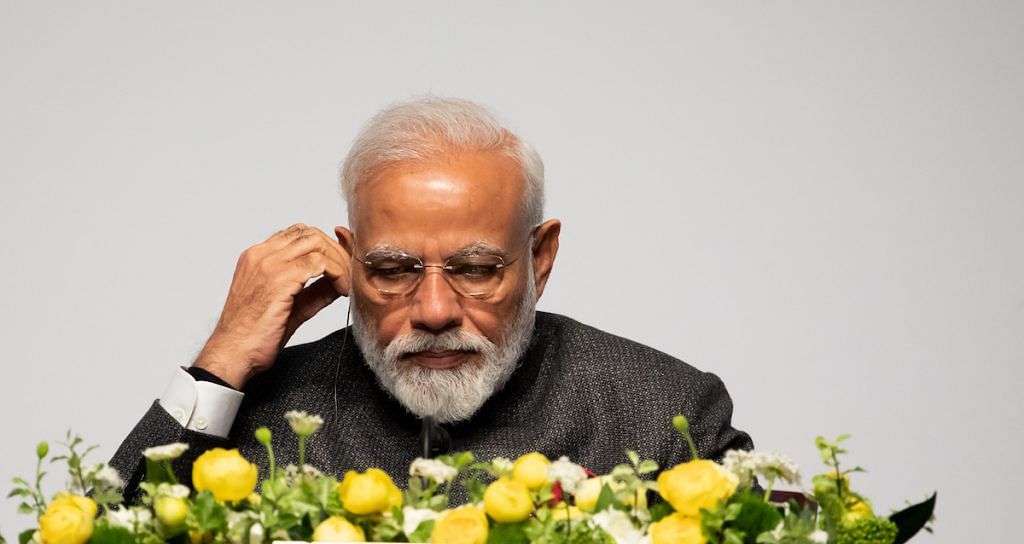An entire week had passed since several Kashmiri students across India complained of being targeted and harassed in their colleges and neighbourhoods after the Pulwama attacks. Meghalaya governor Tathagata Roy had even tweeted about boycotting Kashmiris.
And only then India’s powerful, Twitter-savvy, hyper-communicative Prime Minister Narendra Modi found his voice – to say what every sane citizen had already said in the past week.
In Tonk, Rajasthan, Modi said Saturday: “It is the duty of every citizen of India to protect Kashmir’s sons and daughters. The issue is not whether the incidents against young Kashmiris across India were small or not. These should not have occurred at all. Our fight is for Kashmir, not against Kashmiris.”
It isn’t as if this speech was his first that week. But it took a week for Modi to appear statesman-like – indeed, saying even the utterly banal and humane thing can be called courageous and statesmanlike when times are dire. And his speech clearly shows that he was aware of the arguments over how small or big the incidents were surrounding the Kashmiris’ safety after the attack. But he chose to remain silent.
More than what Modi said, it is this calibrated delay in speaking up that constitutes the Modi playbook.
Also read: Modi govt urges universities to make sure Kashmiri students are safe
The Modi playbook
Narendra Modi’s well-rehearsed pattern goes something like this – let bigotry gain legs, the poison seep in, let the sane and insane headbutt on every platform first. Then weigh in with a trite “let’s all love each other” kind of a speech. His practised and deliberate delay in reacting to incidents of hate is not unlike, but even more sophisticated than, the infamous ‘good cop-bad cop’ routine that L.K. Advani and Atal Bihari Vajpayee played out in the previous avatar of the BJP.
He waits for the hatred to rise from the streets, turn into hashtags and exhaust the critics. And just when people have almost given up looking for a leader or when it no longer matters, he speaks.
Also read: Communal violence in the time of Modi has a distinct shade. Here’s why
Akhlaq murder and Modi’s voice
It took a week for him to react to the 2015 fatal mob attack on Mohammed Akhlaq, when Hindu villagers dragged him out of his home in Dadri, Uttar Pradesh, and bludgeoned him to death based on the mere rumours that he had eaten beef. As a shocked nation outraged and asked why Modi was silent, he continued tweeting during the period about his past visit to the United States, Chinese National Day and a billiard champion. All this, while citizens debated cow fundamentalism, lynching and the BJP politicians called the killing a ‘reaction’. BJP MLA Sangeet Som had already raised the ‘Hinduism is in danger’ pitch in western UP, a region already reeling from the Muzaffarnagar riots.
When the Hindutva venting had taken place and the liberals had been shown their place in every argument, Modi deigned to speak.
“I want to tell you not to pay attention to such statements. We should all get together and march together; only then we can be what the world expects of us,” he said at a public rally in Bihar. For such bland truism, citizens had to wait a week.
Una was all about Modi
It took even longer for Modi to speak up after the 2016 Una attack on four Dalit men who were stripped and lashed because they were carrying dead cows for skinning. And then he made it all about himself. Almost a month later, Modi addressed a public rally in Hyderabad and dramatically declared: “If you have a problem, if you feel like attacking someone, attack me, not my Dalit brothers. If you want to shoot anyone, shoot me, not my Dalit brothers.”
Also read: Cow vigilantes killed at least 44 people in three years, report finds
Delay isn’t a sign of helplessness
The same pattern of delay in action – in transporting the Indian Army — was visible during Gujarat riots in 2002 when he was the chief minister.
It is a clear pattern. The delay isn’t a sign of weakness or helplessness, it is a well-tested political tactic. It keeps alive the mythology of the strong leader without really having to do anything when it matters the most — calming social chaos. Instead, let the debate get poisoned and polarised, consolidate the Hindu fundamentalist votes and then try to position yourself as a ‘statesman’. It is another matter that even a dizzyingly popular and strongman prime minister like Modi is unable to stop the hate and bigotry with his words. But if stopping the bigotry was a goal, he would speak sooner.
After all, he has the time and the heart to tweet about a forest fire in Portugal. That is how attentive he is to news of tragedies.
The goal here is to upgrade his political image and distance himself from the hate mongers on the street, which he would have us believe are spontaneous eruptions of people’s anger.
But there are way too many incidents that he says nothing at all about. Either there is silence or belated platitude.
